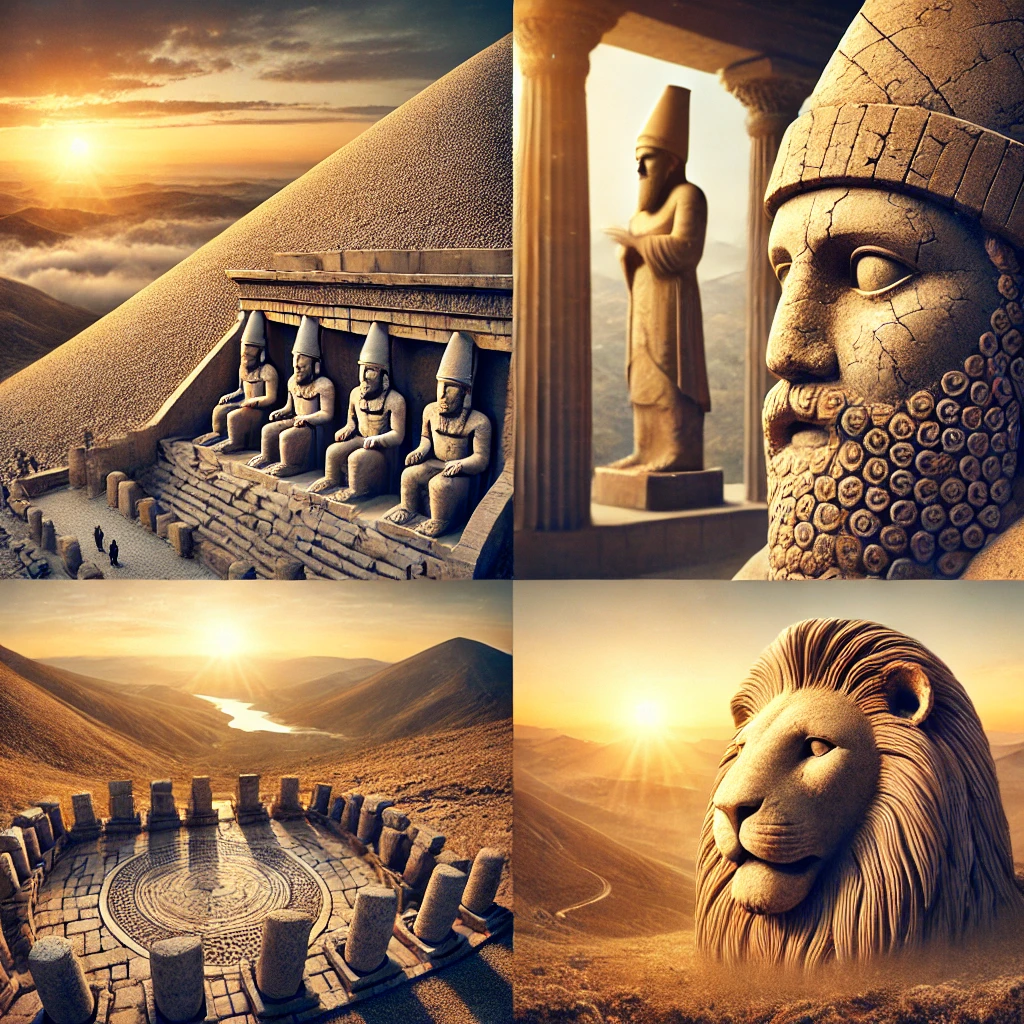Mount Nemrut, Turkey: Exploring the Ancient Wonder
Mount Nemrut, a UNESCO World Heritage site in southeastern Turkey, is renowned for its colossal statues and ancient tombs. This majestic mountain, standing at 2,134 meters, offers visitors a unique blend of history, archaeology, and breathtaking landscapes. In this listicle, we will delve into the top attractions and experiences at Mount Nemrut, ensuring you make the most of your visit to this incredible destination.
1. The History of Mount Nemrut
The Kingdom of Commagene
Mount Nemrut is home to the ruins of the ancient Kingdom of Commagene, which flourished in the 1st century BC. King Antiochus I Theos, the ruler of Commagene, built a monumental tomb-sanctuary on the summit, blending Greek, Persian, and Armenian cultures.
Discovery and Excavation
The site was rediscovered in 1881 by German engineer Karl Sester. Since then, numerous archaeological excavations have revealed the grandeur of Mount Nemrut, shedding light on the kingdom’s unique blend of cultures and religious practices.
2. The Colossal Statues of Mount Nemrut
East Terrace
The East Terrace of Mount Nemrut is where you will find the most impressive statues. These colossal statues, reaching up to 9 meters in height, depict various gods, including Apollo, Zeus, and Hercules, as well as King Antiochus himself. The intricate details and sheer size of these statues are awe-inspiring.
West Terrace
The West Terrace also features a collection of massive statues and stone reliefs. Although not as well-preserved as those on the East Terrace, the West Terrace offers stunning views of the surrounding landscape, making it a perfect spot for photography.
3. The Hierotheseion
The Tomb of Antiochus I
The Hierotheseion is the tomb-sanctuary of King Antiochus I, located at the summit of Mount Nemrut. This monumental structure was designed as a place of worship and burial, combining elements of Greek and Persian architectural styles.
Symbolic Significance
The Hierotheseion reflects the king’s desire to be remembered as a divine ruler. The site includes an impressive tumulus, or burial mound, surrounded by terraces filled with statues and altars, symbolizing the connection between the heavens and the earth.
4. The Tumulus
Man-Made Mound
The tumulus at Mount Nemrut is a 50-meter high, 150-meter wide mound made of loose gravel and stones. This man-made structure covers the tomb of King Antiochus I and serves as a protective layer for the burial site.
Archaeological Challenges
Excavating the tumulus has proven challenging due to its loose structure. Despite this, archaeologists have uncovered significant artifacts and gained insights into the construction techniques used by the ancient Commagenians.
5. The Lion Horoscope
Ancient Zodiac
One of the most intriguing artifacts at Mount Nemrut is the Lion Horoscope, a stone slab featuring a lion adorned with 19 stars and a crescent moon. This ancient zodiac is believed to represent the date of King Antiochus I’s coronation or the founding of the sanctuary.
Astronomical Significance
The Lion Horoscope provides valuable information about the astronomical knowledge of the ancient Commagenians. It is one of the earliest known depictions of a celestial map, highlighting the kingdom’s advanced understanding of the stars.
6. The Scenery and Sunrise at Mount Nemrut
Breathtaking Views
Mount Nemrut offers some of the most breathtaking views in Turkey. The surrounding landscape is characterized by rugged mountains, deep valleys, and expansive plains, creating a stunning backdrop for the ancient ruins.
Sunrise Experience
One of the most popular activities for visitors to Mount Nemrut is watching the sunrise from the summit. The early morning light casts a golden glow on the statues, creating a magical and unforgettable experience.
7. How to Reach Mount Nemrut
By Car
Mount Nemrut is accessible by car from the nearby towns of Adiyaman and Kahta. The drive offers scenic views and takes you through the picturesque landscape of southeastern Turkey.
Guided Tours
Many tour operators offer guided tours to Mount Nemrut, providing transportation, historical insights, and assistance with navigating the site. Joining a guided tour can enhance your visit and ensure you don’t miss any key attractions.
8. Best Time to Visit Mount Nemrut
Seasonal Considerations
The best time to visit Mount Nemrut is during the spring (April to June) and autumn (September to October) months when the weather is mild and the skies are clear. Summers can be hot, while winters can bring snow, making access to the site more challenging.
Optimal Viewing Conditions
Visiting during the early morning or late afternoon provides the best lighting conditions for photography and enhances the overall experience of exploring the ancient ruins.
9. Nearby Attractions
Arsemia
Arsemia, the summer capital of the Kingdom of Commagene, is located near Mount Nemrut. The site features ancient reliefs, inscriptions, and the remains of a palace, offering additional insights into the region’s history.
Cendere Bridge
The Cendere Bridge, an ancient Roman bridge, is another notable attraction near Mount Nemrut. This well-preserved structure spans the Cendere River and showcases the engineering prowess of the Romans.
10. Practical Tips for Visiting Mount Nemrut
Dress Appropriately
Wear comfortable clothing and sturdy shoes, as the terrain can be rocky and uneven. Bring a jacket, as temperatures can drop significantly at higher elevations, especially during sunrise and sunset.
Stay Hydrated
Carry plenty of water, as there are limited facilities at the site. Staying hydrated is essential, especially during the warmer months.
Respect the Site
Mount Nemrut is a UNESCO World Heritage site, so it’s important to respect the ancient ruins and the natural environment. Avoid climbing on the statues and follow designated paths to preserve the site’s integrity.
Conclusion: Discover the Wonders of Mount Nemrut
Visiting Mount Nemrut is a journey through history, culture, and breathtaking landscapes. From the colossal statues and the tomb of King Antiochus I to the stunning sunrises and the rich archaeological heritage, Mount Nemrut offers a unique and unforgettable experience. Whether you’re a history enthusiast, an archaeology buff, or simply a curious traveler, Mount Nemrut promises to captivate and inspire.
For more information and to plan your trip, visit: Visit Mount Nemrut
Latest Update: Jul 10, 2024
Your Content Goes Here
A brief summary of the key points in this article.




